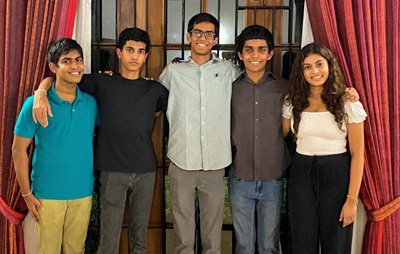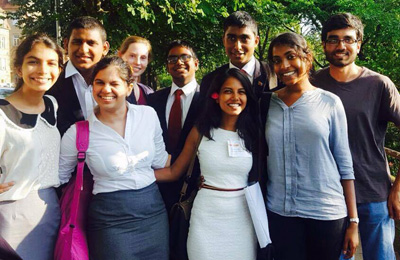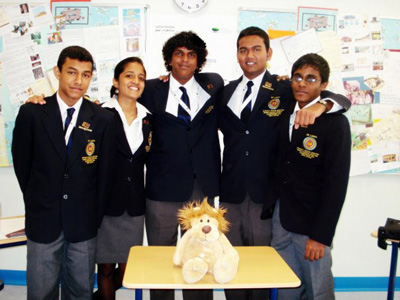Arts
No longer imposters on the world stage
View(s):Involved with the Sri Lanka debating team as debater, coach and administrator since 2010, Sanjit Dias looks back on the team’s long road to success as Sri Lanka made history by becaming runners up at this year’s virtual World Schools Debating Championship

The trail-blazing Team Sri Lanka 2020
An imposter.
That’s what I felt like, watching the advanced rounds of the World Schools Debating Championship (WSDC) ten years ago in Qatar. Team Sri Lanka had broken into the octo-final (round of 16) for the first time at that tournament. But despite the celebrations back home, and the sense of achievement we felt, I was convinced that we did not belong on the same stage as the best teams at the championship. As we watched Canada take the Grand Final against England, I couldn’t believe that these were secondary school students like myself – their knowledge, stylistic flair and self-confidence far surpassed anything I had seen from our own team. That gulf seemed too great to be bridged.
Fast-forward ten years, and Team Sri Lanka is Runner-up at the recently concluded Online WSDC, falling short to a well-oiled Team Canada. This historic run by an incredible team confirmed many of the beliefs and hypotheses held by the local debate circuit, and proved that with the right training and attitude, any team could make it to the very top. This milestone for Sri Lankan debating seemed an opportune moment to reflect on the last decade, and the slow, organic road that led to this year’s success.
When we were selected in 2009, the mood in the circuit was that our best chance of making the octo-final was behind us – indeed, we felt the same. The team that had just participated at WSDC 2009 in Athens was the most experienced in our history, but even they had fallen excruciatingly close, missing the ‘break’ by one. What made the biggest impact on us for 2010 was the almost 10 months of training under coach Deshan Pushparajah, and the input from international coaches Jessica Prince and Alex Campbell. We were introduced to a whole new approach to generating and developing arguments, of debate strategy, and – most importantly – of navigating world schools judging. This long process culminated in Sri Lanka’s first ‘break’, but we were promptly knocked out by Slovenia.
I had two further years at the Championship, but in neither were we able to replicate our feat of 2010; in 2012, once again falling agonizingly close, missing the break by a single ballot.
The next few years were much the same. However, we kept learning from the best teams and debate structures around the world, and did our best to replicate them. Since 2014 we have constituted a national pool which is trained for several months, and from which the final team is selected. We encouraged more tournaments in the school circuit, and developed the semblance of a regular debate calendar. We stressed the importance of style, especially one which suited WSDC. These processes yielded results – 2015 saw Sri Lanka defeat former champions England 3-0, and saw Eran Fernando and Amrita Khandpur rank 28th and 31st on the open speaker tab. This strengthened our belief that we were making progress – but without that crucial break, 2010 seemed more and more like a fluke.

A return to winning ways in 2016
Then, a dramatic breakthrough in 2016 – the team won 7 out of 8 preliminary debates and broke 7th. The dry spell was finally broken. This was repeated the next few years – but still no break in the octo-final hoodoo. The years 2018-2019 saw a shift of power to Asia, with China defeating India in the Grand Final in 2018, and an inspirational Team India returning in 2019 to take the title against Canada.
Sri Lanka was to host WSDC 2019, but we lost the opportunity due to the tragic events of the Easter Sunday attacks. The convenors and organising committee had invested years of hard work in securing the bid and preparing to deliver an excellent WSDC experience, and the Debaters’ Council hoped that bringing the world to Sri Lanka would inspire the local circuit to greater heights in the years to come. Alas, that was not to be.
That brings us to 2020, and having had the privilege of working with the team as technical coach, I take this opportunity to pay tribute to their tremendous effort. The debaters worked for close to ten months – frequent debating, endless retakes of speeches, hours of podcasts and reading to stay on top of current affairs, lectures and deeper research into specific issues – all meticulously planned and tracked on the spreadsheets of the immensely dedicated Head Coach Kithmina Hewage. In particular, the team’s focus on expanding their breadth of knowledge, and on honing the mental and psychological tools to win close debates and go deep into tournaments (“control the controllables”) were keys to their ultimate success. This was truly a team that aimed to ‘out-work’ the rest of the competition, and they fully deserve their results.
Some reflections

Team Sri Lanka 2010 - the first to progress to the knockout rounds
I say this was a slow and organic process for several reasons. When I returned from coaching the team in 2014, I recommended that we secure corporate sponsorship for English debating. Six years down the line, we are yet to have a formal sponsor. This has meant that every coach of Team Sri Lanka has done so voluntarily. This means that (a) they have done so part-time, juggling their work commitments with training, and (b) they have effectively paid to coach the team, with some even being willing to pay out of pocket to get to the competition. It has meant that parents have had to support their children to participate, with the costs being high when the championship has been far from home. It has also meant that Team Sri Lanka has rarely been able to participate in any international competitions in addition to WSDC, as the extra cost to the debaters is prohibitive. It was only because many tournaments went online due to COVID-19 this year, that the team was able to take part in three competitions prior to the championship – that international exposure was crucial to its success. Had these competitions taken place in situ, we would not have been there. Our road to success was organic because it was not fuelled by big money.
It was also organic because it was home-grown. Every coach has been a Team Sri Lanka alumnus, or has come from our own debate circuit. Many who have not been able to take on the full responsibility of coaching have stepped in to share their knowledge and expertise with the team. The team has also been indebted to those who have studied and debated at foreign universities, both for the international experience they bring back, and for the tremendous benefit of their networking.
Which brings me to my final point – this has been an organic process because of the incredible support extended by members of the wider debating community. This support has taken many forms – short visits to Sri Lanka to conduct workshops, online sessions via Zoom, and most importantly – spar debates, against universities as well as other national teams – all for the sake of friendship and goodwill. This has reinforced the best spirit of debating and global cooperation, and I hope that spirit will only grow stronger as the competition becomes fiercer each year.
My intention is not to romanticise this slow, under-funded model of success. Instead, it is to affirm that such a model can in fact yield results – despite all the evidence to the contrary. With greater funding and reach throughout the country, who knows what heights Sri Lanka could achieve?
My intention is also to place on record the appreciation for everyone who has been involved in the Sri Lankan debate circuit over the years – every parent who has encouraged their child into debate, every frustrated coach who has given time to building up their charges, and every debater who has added their voice to the process, whether or not they have personally enjoyed success or recognition – they all share in this achievement.
Team Sri Lanka are no longer imposters – they are the real deal. It gives me great pride to see them finally take their place at the centre of the world stage.

